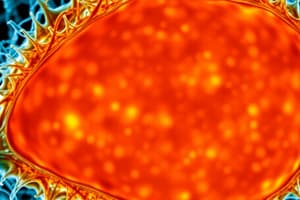Podcast
Questions and Answers
Which of the following statements about prokaryotic cells is correct?
Which of the following statements about prokaryotic cells is correct?
- They are generally larger than eukaryotic cells.
- They are found in plants and animals.
- They lack membrane-bound organelles. (correct)
- They have a membrane-bound nucleus.
What is the primary purpose of cell culture techniques?
What is the primary purpose of cell culture techniques?
- To observe the structure and function of cells in greater detail.
- To provide a means of studying cells efficiently and deriving medications. (correct)
- To classify cells into prokaryotic and eukaryotic types.
- To study the interactions between cells and their environment.
Which microscopy technique is particularly useful for observing the fine details of cell structure?
Which microscopy technique is particularly useful for observing the fine details of cell structure?
- Confocal microscopy
- Transmission electron microscopy (correct)
- Phase-contrast microscopy
- Fluorescence microscopy
What is a fundamental characteristic that distinguishes eukaryotic cells from prokaryotic cells?
What is a fundamental characteristic that distinguishes eukaryotic cells from prokaryotic cells?
Which of the following microscopy techniques utilizes fluorescent dyes to visualize specific cellular components?
Which of the following microscopy techniques utilizes fluorescent dyes to visualize specific cellular components?
Which of the following statements about the size of cells is accurate?
Which of the following statements about the size of cells is accurate?
Flashcards are hidden until you start studying
Study Notes
Article
Biology is the study of living organisms and their interactions with each other and their environments. One of the fundamental concepts in biology is cell biology, which focuses on the structure, function, and behavior of cells. All living organisms are made of cells, and cell biology is the study of these structural and functional units.
Cell Types
There are two main types of cells: prokaryotic and eukaryotic. Prokaryotic cells lack a cell nucleus or any other membrane-bound organelles. This classification includes bacteria and archaea. On the other hand, eukaryotic cells have a membrane-bound nucleus and other membrane-bound organelles. These cells are found in plants, animals, fungi, and protists. Eukaryotic cells are generally larger than prokaryotic cells, ranging from 10 to 100 micrometers in diameter.
Cell Culture
One of the crucial techniques in cell biology is cell culture, where cells are grown in artificial environments outside of a living body. This technique provides a means of studying cells efficiently and deriving medications.
Microscopy
Advancements in microscopy have greatly enhanced our understanding of cell structure and function. Techniques such as transmission electron microscopy, phase-contrast microscopy, confocal microscopy, and fluorescence microscopy have enabled scientists to observe cells in greater detail.
Techniques and Tools
As cell biology progressed, new tools have been developed to study cells. For instance, cell fractionation involves breaking up cells, usually by high temperatures or ultrasound, followed by centrifugation to isolate specific cell components. Additionally, cytometry employs laser scattering to analyze cells based on factors like size, density, and granularity.
In conclusion, cell biology is a critical branch of biology that explores the structure, function, and behavior of cells. Through various techniques and advances, we have gained a deeper understanding of cells and their roles in maintaining life and health.
Studying That Suits You
Use AI to generate personalized quizzes and flashcards to suit your learning preferences.




